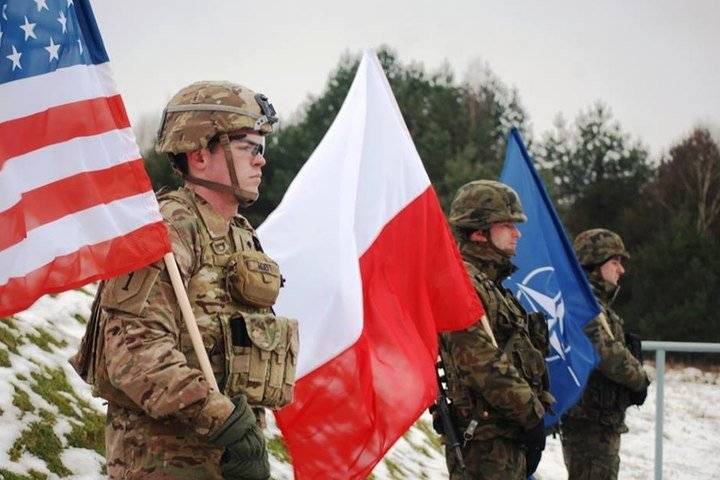
Political scientist Oleg Nemensky on how Warsaw became the initiator of the current approach to cooperation with the U.S.
News about Poland’s preparedness to independently pay for the construction and deployment of American military bases in their country was met with amazement in Russia. The Poles are ready to incur the costs of promoting American interests. There is widespread feeling that Poland is a puppet of the U.S., but that is very far from the reality.
As you recall, there was a leak of a rather important document from the Polish Ministry of Defense entitled “Proposal for the Permanent Presence of the US in Poland.” It contains roughly 40 pages of a plan to construct and modernize the country’s old infrastructure for the deployment of U.S. military personnel – primarily a U.S. armored division – to the city of Bydgoszcz. The Polish government is ready to spend up to $2 billion. The need for such a significant increase in the U.S. military presence was explained by the threat posed by the East: “The creation of such a force is necessary in order to contain the Russian threat to Europe,” according to the document, which contains maps of the country’s military infrastructure – those currently in use and also those that are planned.
It’s worth noting that the document’s authenticity was immediately recognized by the Ministry of Defense, and its press service explained that this document was sent to members of Congress in the United States, as well as to a number of government institutions and analysts in the U.S. In fact, the country’s leadership never concealed their views. For example, new Foreign Minister Jacek Chaputovich, who was appointed in January, laid out his plans in a speech to Parliament in March, saying, “We will strive for an even more permanent consolidation of elements of the U.S. armed forces in Poland.”
The key to understanding what is happening is to realize that Poland is not an obedient actor in Polish-U.S. relations, but rather the initiator, and in many ways the author of the existing form of cooperation. The course for a comprehensive alliance with the U.S. is the constant presence of Polish politics and the ruling Law and Justice Party’s calling card. This primarily concerns the military-political partnership, which is seen as the main way to achieve the geopolitical goals of the two countries.
Poland, an average country that does not want to be among the “small EU countries,” but wants to be on a par with the five (so far) main states of Europe. Poland’s own weight is not enough to achieve this. The only way to increase its presence is to become the region’s leader. There are actually two regions. One is Central Europe, or rather, the region between the Germans and the Russians, and the so-called New Europe, which has many different interests and values than those of the “old” Europe, and needs to strengthen its voice at the pan-European level to confront Berlin and Brussels. The second region is Eastern Europe, with the exception of Russia. In other words, it is Ukraine, Belarus, Moldova and the three Transcaucasian republics. The task, openly declared by Warsaw, is to tear these countries away from Russia and integrate them into Europe, becoming their main partner and trustee in the European Union.
But Poland cannot pursue such a policy on its own, and it is also impossible to force Western European partners to support these plans. NATO does not completely trust that Poland will strengthen its Eastern flank, which it pays a lot of attention to. There are too many contradictions inside of the organization, and therefore, not much hope for U.S. support and its status as Washington’s main ally in the region.
In the Sejm*, new Prime Minister Mateusz Morawiecki declared that Poland wants “to realize its regional policy in Europe together with the U.S.” Poland is ready to pay for it, because this is the most important demand it has put to Washington under the new president. Warsaw accepts Donald Trump’s rules of the game, and wants to show him this acceptance. So, at the end of March, Poland agreed to buy U.S. Patriot air defense systems for $4.75 billion, and is now offering $2 billion more. Judging by President Andrzej Duda’s recent visit to America, the Americans are submitting to harsh bargaining, and showing indifference to their partners.
Poland is playing their game, and has a very ambitious plan. There is, however, one dubious point: the whole game is designed with the idea that Russia is weak and passive, and will not engage in a real military clash. Such bold military planning, with the complete absence of fear of war, has already played a very evil joke on the countries involved. This course of endless confrontation and the cultivation of imaginary hostility by a large neighbor, fueling Polish politics, threatens to lead all of Europe to a very dangerous time. It’s already known that Poland will consider itself the victim in this case.
*Editor’s note: The Sejm is the lower house of the Polish Parliament.

Leave a Reply
You must be logged in to post a comment.